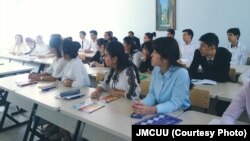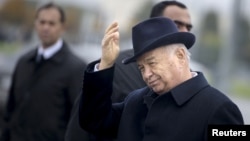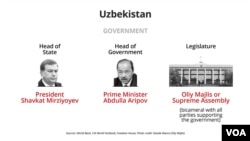It’s been a dramatic two years since Shavkat Mirziyoyev became president of Uzbekistan, Central Asia’s most populous nation. Many doubted he could bring change, since he was a byproduct of the deeply rooted authoritarian regime ruled for 27 years by his predecessor Islam Karimov. But Mirziyoyev introduced ambitious reforms, promising transformation in every sector. Supporters and critics alike hope these sprouts of change endure. A country of more than 33 million, Uzbekistan is strategically important to all of the major powers. In the first of a three-part series, Navbahor Imamova, the first VOA journalist ever accredited to report from Uzbekistan, takes a hard look at what has and hasn’t changed for press freedom. Her next pieces will be on political reforms and Tashkent’s engagement with the world.
‘We must change’
Uzbek media, long a mouthpiece of the state, has diversified, with the emergence of online sources, such as Kun.uz, Daryo.uz, Qalampir.uz, and the recently launched Turon24.uz. Newspapers, the official news agency and even the state-run TV network now tackle a wider range of issues, including unemployment and the lack of housing and opportunity.
“This is a breakthrough because we used to disseminate state messages,” argued Abdusaid Kuchimov, head of Uzbekistan’s National News Agency. “We must change because our country needs reliable media to both inform and explain the reform process.”
From the public’s standpoint, such openness to change could fulfill a deep-seated desire for a greater variety in news sources, especially those that dare to challenge the status quo. RFE/RL and BBC are not yet accredited. But Kuchimov points out that his agency now runs VOA stories, including critiques and analysis.
Eldar Assanov, who edits and writes for Daryo.uz and Turon24.uz, said Uzbek journalists and bloggers “want change but lack the fundamentals: skills, experience and courage. Freedom is hard. It involves understanding and respecting each other’s rights. We have only just started communicating with each other, mainly via social media.”
Nargiza Saidova, head of Turon24.uz, says her outlet aims to be a regional, independent, multimedia news agency.
“We want to have a competitive edge — to be reliable, timely and relevant,” she said.
But a long journey lies ahead for Uzbek journalism. The authorities have always tightly controlled the media and those mechanisms remain in place, even though official censorship was banned in the early 2000s. Today, no journalists are behind bars, but critical bloggers complain of harassment and surveillance.
Reforms
This backsliding on reforms and resurgence of old habits are compounded by other problems. The internet is slow, and the security services sporadically block critical sources. Officials are quick to blame technical issues and note ongoing work to upgrade infrastructure, yet it is impossible to access even VOA at times anywhere in the country.
This affects behavior and choice: reporters say they remain fearful and censor themselves, especially when covering governance or the security sector. But many argue that it is progress merely to be able to cover public opinion or economic issues, which inevitably highlights corruption and lawlessness.
Even the most outspoken journalists and bloggers say they dare not yet criticize President Mirziyoyev. Instead, many use his own words as a “shield” when covering sensitive issues. Critical pieces often deploy quotes from the reform-minded president, who has himself raised questions about regional and local governance, security affairs, the judiciary, social ills, or problems in health care and education.
Sherzod Kudratkhodjayev, rector of the newly opened University of Journalism and Mass Communications in Tashkent, argues that his institution reflects the potential of more media freedom.
“Our university intends to produce a new generation who reflect the new Uzbekistan. For that, we need to work closely with international partners and build strong ties with foreign journalism schools,” he said.
Kudratkhodjayev hosts “International Press Club,” a live talk show on Uzbekistan24, a premier news channel. Uzbekistan had no live programming until 2017, but live broadcasts in discussion formats now tackle socio-economic issues. More than a dozen TV channels report the news but mostly praise rather than question the system.
Media leaders nod to this criticism, saying lack of expertise — and courage — is a challenge they must confront. Like many sectors, they say, their field also needs significant support from outside.
“We want to claim our rights as journalists and push for openness and accountability,” said Farhod Umarov, who investigates and reports on Uzbek penal colonies, interviewing female and juvenile inmates. “This is a task no journalist dared to take on even two years ago.”
Communication between government leaders and citizens is still one-way, mostly through speeches and statements. Mirziyoyev has given no interviews to Uzbek or foreign media and has had no press secretary since 34-year-old Komiljon Allamjonov resigned in recent weeks, claiming illness.
Not able to do normal duties
Well-positioned sources, speaking on condition they not be identified, say he was pushed out by aides who saw him as too much of a reformer. Ironically, Allamjonov had not felt able to perform as a normal press secretary by holding interactive briefings or speaking in public for the president and administration. But he did make changes that suggest the potential for a different dynamic.
Under Allamjonov’s influence, Mirziyoyev established accounts on social media. His press service is no longer shut to foreign journalists and live broadcasts advertise his activities. Allamjonov also set up a media center and was active online, including with videos about Mirziyoyev’s daily work, which appear on social media and broadcast outlets. Uzbek journalists hope that his successor pushes for still greater press freedom and transparency.
Critics doubt Mirziyoyev’s reforms are ultimately about liberalization, arguing that he aims simply to modernize while retaining authoritarian features. Others are willing to be patient, arguing that reforms are never linear and that Uzbeks must learn how to reform their country by trial and error.
But for many domestic observers, Uzbekistan has taken tiny steps toward media freedom, and hopefully the space will gradually widen.
“The change in leadership does not mean our society has changed,” said Umarov, the penal colony investigator. “How do we change the mentality? We need massive changes in the way media operate and journalists do their job.”






